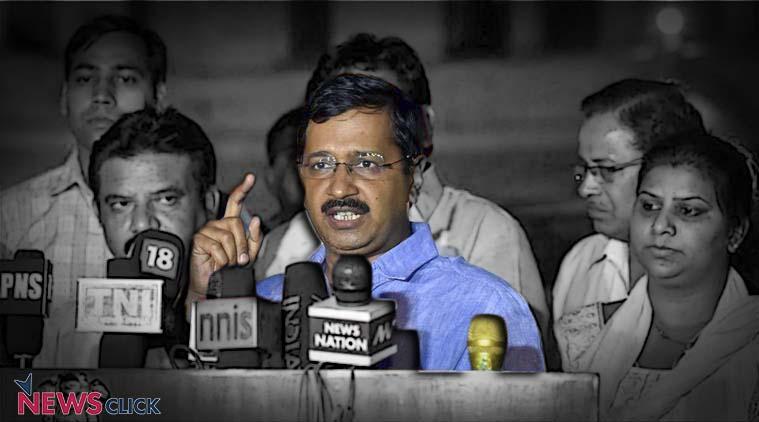In Many States, Calls to Disqualify MLAs for Holding Offices of Profit

Newsclick Image by Sumit
The Order passed by the Election Commission on January 19, which was later notified in the Official Gazette on January 21, effectively recommended to the President of India that 20 AAP MLAs should be disqualified on the ground of holding an office of profit. The President gave his assent on January 22. Though AAP had filed a petition seeking a stay on the recommendation from being sent to the President on January 22, by the time the matter had come up for hearing before the Delhi High Court, the President had already assented. AAP stated that they would file a fresh petition on January 23 challenging the disqualification.
AAP contended that since the High Court had declared the appointments null and void ab initio, the issue of disqualification did not arise. The Election Commission on the other hand found that the High Court Order did not use such a phrase and instead had ‘set aside’ the appointments. The difference between the two is that setting aside an appointment means that from the date the Order is passed the appointment ceases to exist, whereas declaring the appointment void ab initio would mean that the appointment never existed. This key difference is what caused the Election Commission to rule against AAP.
The petition that resulted in the present order is not the first to be submitted before an authority. On May 1, 2015 the High Court of Judicature at Hyderabad stated that the appointment of 6 TRS MLAs to the post of Parliamentary Secretary was patently illegal. On July 4, 2016 AAP had submitted a complaint to the Election Commission about 116 BJP MLAs in Madhya Pradesh for violating ‘office of profit’ norms as well as the Representation of People’s Act. The High Court of Punjab and Haryana on July 6, 2017 set aside the appointment of 4 BJP MLAs as Parliamentary Secretaries in the Government of Haryana.
On November 9, 2017 the High Court of Meghalaya questioned the appointments of 17 Congress MLAs to the post of Parliamentary Secretaries, and left it to the Governor whether the MLAs should be disqualified or not. The Governor of Meghalaya is currently waiting for the Election Commission to submit its view on the disqualification of the MLAs. Since the High Court passed its Order, 10 out of the 17 MLAs quit their posts as Parliamentary Secretaries. The Congress has demanded that the Election Commission disqualify 11 BJP MLAs in Madhya Pradesh on the basis of its petitions to the Commission and the Governor in 2016. Similarly in Sikkim a consortium of several political groups under the banner of the Joint Action Committee (JAC) has petitioned the Governor and the Election Commission seeking the disqualification of 14 SDF MLAs for holding offices of profit. The High Court of Sikkim had in August 2017 declared the appointment of 11 of the 14 MLAs as Parliamentary Secretaries as ‘unconstitutional’.
That the Election Commission has not taken up the other matters is more a matter of procedure. Article 192 of the Constitution of India lays down the procedure for the disqualification of Members of the Legislative Assemblies. Under this provision, the Governor shall have the final say on the matter of disqualification, however, the Governor must first refer the matter to the Election Commission of India and then act on its recommendations. Except for Meghalaya, in all the other states where similar cases have arisen the Governor has not referred the matter to the Election Commission. As per Article 239AA of the Constitution, in the case of Delhi, since the Chief Minister and other Ministers are appointed by the President, the authority who will refer a matter for disqualification will be the President.
Get the latest reports & analysis with people's perspective on Protests, movements & deep analytical videos, discussions of the current affairs in your Telegram app. Subscribe to NewsClick's Telegram channel & get Real-Time updates on stories, as they get published on our website.
























